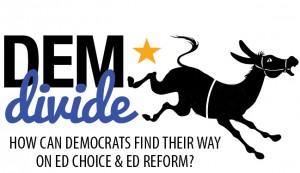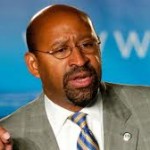Editor's note: This is the third post in our series on the Democratic Party's growing divide over ed reform and ed choice.
by Myles Mendoza
Mayor Rahm Emanuel is the in the political fight of his life. As a result of challenging the status quo by fighting for reform in Chicago Public Schools, Emanuel’s reign as mayor of one important cities in the United States is not guaranteed to continue.
Here’s one reason why: the mayor polls poorly among the city’s many African-Americans. In fact, only eight percent of them would support Emanuel if the election were held the today.
That’s one of the reasons why Chicago Teacher’s Union President Karen Lewis is currently entertaining the idea of a possible mayoral run. According to a recent Chicago Sun Times poll, she was leading Emanuel 45 percent to 36 percent with 18 percent of the likely voters undecided.
Previously, the Mayor faced an even tougher fight against another potential candidate, Cook County Board President Toni Preckwinkle. Although she withdrew, a race against Preckwinkle showed Emanuel losing by 24 points.
While, recent Ed Choice Illinois polling shows the Mayor now ahead by 12 points generally and by 3 points in the African-American community, it is clear his greatest challenge is with African-Americans. How did the Mayor get into this situation?
When he first entered office, Emanuel rightly assessed that African-American neighborhoods were getting the short end of the stick when it came to the quality of the education they received.
Emanuel looked to the education reform community for solutions. Chief among them was the concept of making schools accountable by tying eligibility for public dollars to performance.
That’s why he expanded high-performing charters like Noble Street and Urban Prep and shut down the highest amount of low-performing schools in American history - the majority of which were located in African-American communities.
But, in doing so, he made a fatal flaw. (more…)
Jeb Bush, among the most vocal and visible supporters of Common Core academic standards, took a hard jab at critics Thursday, suggesting they drop the conspiracy theories and offer solutions.
“What I want to hear from them is more than just opposition,” he said to 800 people in Boston, gathered at the annual conference put on by his Foundation for Excellence in Education. “I want to hear their solutions for the hodgepodge of dumbed-down state standards that have created group mediocrity in our schools.”
“Criticisms and conspiracy theories are easy attention grabbers,” he continued. “Solutions are hard work.”
Bush’s comments come as opposition to Common Core continues to generate a sharp-edged anxiety in his home state and beyond. This week, hundreds of Florida supporters and opponents turned out for public forums ordered by Gov. Rick Scott. Some critics said the standards, which the Republican-dominated Florida Board of Education adopted in 2010, were tied to fascists and communists. The term 'Common Core' has become so radioactive the state board actually debated this week whether to use it.
At a panel discussion following Bush’s speech, political strategist Mike Murphy said polling shows most of the public still isn’t familiar with Common Core. The heaviest opposition, he said, comes from Republican primary voters, who, when they’re first asked about the standards, are opposed 2-to-1.
“They think it’s a secret plot controlled by red Chinese robots in the basement of the White House,” he said. “No wonder they don’t like it.” (more…)
 Texas: State lawmakers propose an ambitious school choice expansion plan that includes a tax credit scholarship for low-income students and the lifting of a cap on charter schools (Dallas Morning News). More from the Austin American Statesman and San Antonio Express-News.
Texas: State lawmakers propose an ambitious school choice expansion plan that includes a tax credit scholarship for low-income students and the lifting of a cap on charter schools (Dallas Morning News). More from the Austin American Statesman and San Antonio Express-News.
Tennessee: A key state lawmaker, House Speaker Beth Harwell, says the legislature will consider a statewide charter school authorizer (The Tennessean). Area businesses help push growth of charters in the Nashville area (The Tennessean). Gov. Bill Haslam gives mixed signals on the possibility of voucher legislation next year (Knoxville News-Sentinel). More from the Memphis Commercial Appeal.
Louisiana: The Recovery School District in New Orleans is moving towards an all-charter system (New Orleans Times Picayune). The latest enrollment counts show families who accepted vouchers are sticking with their schools (Alexandria Town Talk).
North Carolina: Charlotte-Mecklenburg schools superintendent Heath Morrison calls private, charter and traditional public school leaders together to discuss the possibility of partnerships (Charlotte Observer).
Indiana: A new study finds the state's charter schools are among the best in the nation when compared to their traditional public school counterparts (Indianapolis Star). But the poor performance of many charters under one authorizer, Ball State University, drags down the overall results (Indianapolis Star).
Illinois: Members of the Chicago teachers union march to protest a wealthy charter school supporter and ally of Mayor Rahm Emanuel (Chicago Sun Times).
Ohio: Federal education officials are investigating whether charter schools in Ohio and three other states - Texas, Pennsylvania and Wisconsin - are discriminating against students with disabilities (StateImpact Ohio).
Wisconsin: Possible expansion of vouchers, extra pay for low-performing schools with improvement plans, and more education funding are all on tap for the next legislative session, Gov. Scott Walker says (Milwaukee Journal Sentinel).
Georgia: A judge rules that the Atlanta school district must stop withholding money from the city's charter schools to help pay for the district's pension program (Atlanta Journal Constitution).
Michelle Rhee, in this morning's Tampa Bay Times:
I'm a Democrat because I believe in the party's basic principles, particularly the idea that we have to look after one another and stand up for those who need help. I believe in fighting for the civil rights of all Americans, especially children and those facing injustices.
That's why I was heartened to see Chicago Mayor Rahm Emanuel advocating for the rights of kids in his standoff with the Chicago Teachers Union. Although his stance made perfect sense to me, it surprised many political observers.
Emanuel went head to head with the union to get a better contract for the city's schoolchildren. In the process, he underscored a transformation in the Democratic Party. Increasingly, those who staunchly side with unions at any cost appear to be in the minority, while more Democrats are saying we have to look at education differently. Full op-ed here. RedefinED interview with Rhee, on why ed reform must be bipartisan, here.
 Chicago: The teachers union strike is over, but it highlights a growing rift within the Democratic Party over school choice and education reform (Christian Science Monitor). Mayor Rahm Emanuel can now focus on expanding charter schools (Chicago Tribune). (Image from louisville.com)
Chicago: The teachers union strike is over, but it highlights a growing rift within the Democratic Party over school choice and education reform (Christian Science Monitor). Mayor Rahm Emanuel can now focus on expanding charter schools (Chicago Tribune). (Image from louisville.com)
Florida: The state teachers union sinks $1 million into the campaign over a constitutional amendment that has little to do with education (redefinED). Republican Gov. Rick Scott and a Democratic candidate for Congress make a joint appearance at a new charter school (redefinED). The latest enrollment numbers show school choice in Florida has become mainstream (redefinED). The Volusia school superintendent recommends the school board reject all nine applications for new charter schools next year (Daytona Beach News Journal).
Maine: A task force begins considering legislative proposals for expanding school choice. (Kennebec Journal)
Virginia: A Richmond charter school welcomes a critique from school district officials. (Richmond Times-Dispatch)
Tennessee: State education officials fine the Nashville school district $3.4 million for denying a charter school application. (Education Week)
Michigan: Lawmakers are set to discuss parent trigger legislation. (MLive.com) (more…)
From the Associated Press tonight:
CHICAGO (AP) -- The Chicago teachers union decided Sunday to continue its weeklong strike, extending an acrimonious standoff with Mayor Rahm Emanuel over teacher evaluations and job security provisions central to the debate over the future of public education across the United States.
Union delegates declined to formally vote on a proposed contract settlement worked out over the weekend with officials from the nation's third largest school district. Schools will remain closed Monday.
Union president Karen Lewis said teachers want the opportunity to continue to discuss the offer that is on the table.
"Our members are not happy," Lewis said. "They want to know if there is anything more they can get."
She added: "They feel rushed."
 It’s getting harder and harder for critics to torpedo education reform ideas like the “parent trigger” by distorting political affiliations. The evidence just keeps getting in the way.
It’s getting harder and harder for critics to torpedo education reform ideas like the “parent trigger” by distorting political affiliations. The evidence just keeps getting in the way.
The latest example is what happened at the U.S. Conference of Mayors meeting in Orlando last weekend. With prominent Democrats leading the charge, the mayors in a voice vote unanimously endorsed parent triggers, which aim to help fed-up, low-income parents turn around struggling schools.
“Too many districts,” their resolution said (go to page 169), “continue to turn a blind eye toward some of the worst performing schools … ”
Now, whatever you think of parent triggers as a school-improvement tool – and there’s plenty of room for fair-minded debate here - it’s undeniable that critics have gotten considerable traction by portraying the notion as conservative, corporate, far-right and Republican. This was especially true in Florida. Parent trigger legislation was narrowly defeated in March after weeks of being caricatured as another sinister device for Jeb Bush, the Koch brothers and the American Legislative Exchange Council to mine billions of dollars from the privatization of public schools. (If you think my description is over the top, please watch this video.)
It’s true a lot of “conservative” ed reformers like the idea of a parent trigger. But it’s true, too, that the idea of giving low-income parents leverage and options, including the possibility of converting their schools into charter schools, has roots in “liberal/progressive” circles. (My apologies for the air quotes; after covering education in Florida for eight years, the labels just no longer make sense to me.) The sponsor of the original parent trigger bill in California, former state Sen. Gloria Romero, is a Democrat. Ben Austin, who heads the Parent Revolution group that is pushing the idea from state to state, is a former staffer in the Clinton White House. Rahm Emanuel, the former chief of staff to Barack Obama and now mayor of Chicago, is a fan, too.
All that wasn’t enough to scrub the perceived partisan funk off the Florida bill. But all indications are that it will resurface next spring. And maybe last weekend’s vote will help it be judged on its merits rather than its alleged lineage. (more…)
When he led New York's Rochester City School District, Jean-Claude Brizard received a vote of no-confidence from the teachers union. Not surprising: Brizard took an aggressive approach to reform that embraced the shakeup of failing schools, merit pay for teachers and the autonomy driving innovations at charter academies. Now Chicago Mayor Rahm Emanuel has installed Brizard as the chief executive for Chicago Public Schools. A lot has been made yesterday and today of Brizard's support of charters, but the superintendent's own words from more than three years ago suggest a philosophy of public education that would have been anathema to most Democratic administrations at the time.
In an op-ed published June 24, 2008, in the Rochester Democrat and Chronicle, Brizard wrote:
We need innovation! As superintendent of a large public school system, I support the creation of great options for students. I support charter schools, charter management organizations, our Urban-Suburban program and others that provide or will provide options for our city and its residents. This will create competition and keep our system agile and responsive. One size does not fit all!
… Overall, the success of charter schools nationwide is as mixed as it is in regular district schools. However, where you have a great leader and team who understand how to leverage the flexibility and autonomy of charter schools, great things happen. It is this flexibility and autonomy that we, as school district leaders, need to learn from to inform our work and policies.
… The stakes are too high for anyone to have a monopoly on this work.